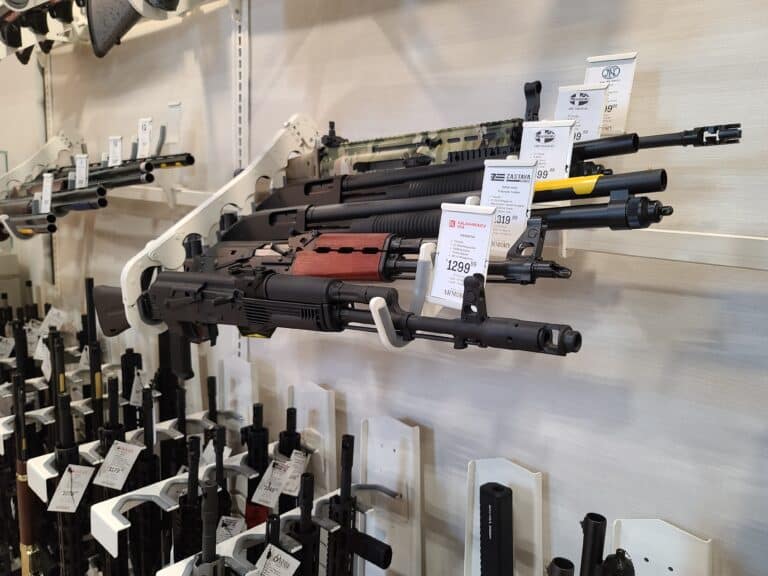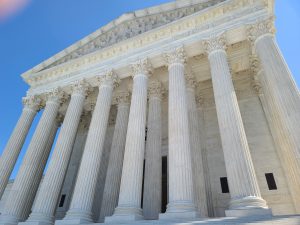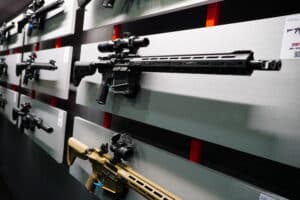The Supreme Court’s decision not to intervene in the case against an Illinois city’s AR-15 ban has caused consternation and celebration on either side of the debate. But the cheers and jeers are premature.
On Wednesday, the Cout unceremoniously denied an emergency request to block Naperville, Illinois’s so-called assault weapons ban. It didn’t offer any explanation for the decision, and none of the justices attached any of their thoughts either. That is undoubtedly a loss for the National Association for Gun Rights (NAGR), who brought the case, and gun-rights advocates hoping for a quick resolution.
But it isn’t a major one. It’s akin to missing a buzzer-beater from beyond half-court… at the end of the first quarter. The game is far from over.
The fact that this was an emergency request gives some insight into why it doesn’t represent the end of the road. Naperville passed its ban on AR-15s and similar semi-automatic firearms in August 2022. NAGR filed suit soon afterward. But by February, a federal district judge denied a preliminary injunction against the Naperville ordinance. The Seventh Circuit rejected NAGR’s request to block enforcement of the law during the appeal process.
When NAGR took that same request up to the Supreme Court, its chances of succeeding were slim. The Court rarely shortcircuits a case that hasn’t been heard on the merits and grants emergency injunctions. In fact, it rarely even considers doing so.
That’s what made Justice Amy Coney Barrett, who oversees the Seventh Circuit, requesting a brief from Naperville defending its ban intriguing. It suggested the Court was at least considering intervening.
So, it’s understandable why the denial disappointed many in the gun-rights world, even if it was the most likely outcome.
But it was the most likely outcome. In fact, the Court already delivered that result in two other Second Amendment cases this year alone. It seems clear the justices want to see how gun cases develop in the lower courts before they jump back in with both feet.
It’s understandable that gun-rights advocates are disappointed by this slower pace, but it has been less than a year since the landmark ruling in New York State Rifle and Pistol Association v. Bruen. The standard set in that case is in its infancy, and it makes sense the Court, in addition to respecting the process of the lower courts, would want to see how different judges apply it to varying questions before they weigh in again.
Two justices have already said as much. In Antonyuk v. Nigrelli, the Court denied an emergency request to block New York’s Bruen-response law and its voluminous new restrictions on gun carry. Justice Clarence Thomas, who wrote the majority opinion in Bruen, joined Justice Alito in explaining why they voted not to intervene.
“I understand the Court’s denial today to reflect respect for the Second Circuit’s procedures in managing its own docket, rather than expressing any view on the merits of the case,” Alito wrote.
However, they also noted the New York law presents “novel and serious questions under both the First and the Second Amendments.” They also praised the district court’s ruling against much of the law as “a thorough opinion.” Importantly, Alito also noted the Second Circuit Court of Appeals had issued “unreasoned summary stay orders” against the injunctions in Anyonyuk and several other cases involving the New York law. He told the plaintiffs they should come back to the Court if the proceedings didn’t speed up.
“Applicants should not be deterred by today’s order from again seeking relief if the Second Circuit does not, within a reasonable time, provide an explanation for its stay order or expedite consideration of the appeal,” Alito wrote.
The Second Circuit has put the New York gun cases on an expedited schedule. Notably, the Seventh Circuit may have gotten the message on this point as well. It has done the same with a nearly identical case challenging the statewide ban that has made it further along on the merits. That may have factored into the Court’s decision not to issue an emergency injunction in the Naperville case.
Since we don’t have any insight into the specifics of the Court’s decision-making, it’s impossible to know for sure. We don’t know why none of the justices commented on this case after Alito and Thomas praised the district court’s decision blocking New York’s carry restrictions. It could be noteworthy that nobody did the same for the district court decision upholding Illinois’s AR ban, but that’s just speculation.
At the very least, though, we know some on the Court are paying close attention to the case. And it’s safe to say, with half a dozen active cases across the country, the legal battle over “assault weapon” bans is far from over.







2 Responses
I also don’t think it’s a surprise that SCOTUS didn’t take the case and that none of the court members made any written comments. I also think SCOTUS may wait to weigh in until at least two circuit courts (notably the 2nd and 7th) rule on pending 2A issues…especially the outright gun bans. That way if two circuit courts rule differently creating a “circuit split”, SCOTUS can step in and resolve the differences. Alternatively, they may want to wait until all the ongoing 2A cases are adjudicated by the circuits to ensure they have all of the major issues on the table so they can make one all-encompassing ruling that would apply nationwide. I’d like to see a Bruen on steroids!!!
I know that most of our 2A advocates are disappointed and frustrated by the slowness of the court system given all of the 2A cases working through the legal process. I think we need to be patient. We didn’t get into the gun control mess we’re in overnight…and it’s going to take some time to get back all or most of the rights we’re entitled to.
Thanks for all you do.
Yea, I understand why gun-rights advocates are frustrated too. But I think things are still generally tilting in their favor. The courts take longer to process cases than most people realize. If anything, they’re moving faster than normal on Second Amendment cases right now. But it’s still going to be a little while before we get really big rulings from appeals courts or SCOTUS.